.png)
The Definitive Guide to Professional Tooth Whitening
This comprehensive guide for tooth whitening was created with expert contributions from White Dental Beauty & Style Italiano and contains all you need to know about professional tooth whitening. From the tooth whitening industry in numbers, to the different whitening options available for patients to clinical cases and regulations and protocols for dentist and dental practitioners, this guide has it all!
Foreword
As consumer demand for tooth whitening increases – part of a wider trend towards aesthetic dentistry – the opportunities for dental professionals to capitalise on this growing need are as plentiful as the complexities involved.
From the range of treatments on offer to the tendency towards misinformation and misunderstanding among consumers, not to mention the legalities involved, dental professionals need a trusted source of expertise. Expertise that can inform and advise quickly and comprehensively on this burgeoning area. And, working alongside Style Italiano, this guide is designed to do just that…
“We believe in creating effective, affordable & minimally invasive dentistry which will improve both health and aesthetics. Using a combination of tooth whitening and restorative materials, dentists can achieve outstanding and predictable results. This is the dentistry that the patients want and more importantly can afford. If we can deliver this using great materials that have long lasting, highly aesthetic results, then we will have a successful practice with happy customers that recommend us to family and friends”. – Style Italiano
This guide outlines the key drivers fuelling the demand for professional tooth whitening, introducing and outlining the various options available, and highlight one of the most popular, affordable and effective treatments: custom tray whitening. Also, we look at effective marketing of tooth whitening to consumers, examine the all important bottom line, and how you can expect profits to grow.
Dental professionals are busy people with many demands on their time, yet being able to effectively and efficiently service a growing consumer need is essential for any practice to continue to thrive. We trust that this guide will prove to be a powerful tool in enabling you to deliver what today’s consumers want, while empowering you to stay one step ahead of competitors.
How Tooth Whitening is Growing in Popularity
In a world of social media and smartphones, we are only ever one click away from a photo being snapped and shared with the world. It is making people more aware than ever of how their teeth – and their smiles – look…
The global cosmetic dentistry market is expected to reach US$27.95 billion (£22.5 billion) by 2024 (source: Grand View Research, Inc. July 2016), and the demand for professional tooth whitening is one treatment driving this growth.
With 99.7% of people citing their smile as their most important social asset (source: American Academy of Cosmetic Dentistry), it is clear why whiter teeth are one of today’s most popular dental requests.
With more people opting for aesthetic dental procedures, treatments are becoming more advanced as well as more affordable.
Confidence in tooth whitening in particular is also spreading. As Anna Salat, Style Italiano says, “Not many people know that professional tooth whitening is safe, easy and inexpensive. When I demonstrate these advantages to patients, they often recommend the treatment to others. This is one of the reasons why bleaching is becoming more popular and the demand is growing.”
There are multiple benefits to consumers, including:

– Looking younger
– Improving self-confidence
– Boosting career opportunities
– Encouraging people to smile more
The procedure has a wide appeal to people of all ages, and the target audience can be broadly segmented into three key types of person:
– Convenience – uninitiated users quick to trust brand advertising
– Clinician lead users
– High expectation – media lead users
The ‘convenience – low expectation’ user wants:
– To try whitening without a large investment
– No hassle, no wait, no messy tray, no worries
– Affordable treatment that can be repeated regularly
– A quick fix
The ‘clinician lead’ user wants…
– Best long term effect and longevity of the treatment
– Best aesthetic and professional result – and they are willing to invest time and money to achieve this
– Gold Standard in tooth whitening
The ‘high expectation – media lead’ user wants…
– Immediate results
– To push the boundaries of whitening
– To pay more for the best results
Online Activity Reflects Growing Demand
The interest in tooth whitening can be seen from the huge amount of consumer engagement with online content related to the subject. While the quality of the content might be debatable, the interest is clear. For example:
– An article titled ‘You Can Whiten Your Teeth With Baking Soda By Simply Following These 4 Methods!’ from December 2016 has attracted 13k Facebook engagements to date.
– An article from February 2017 titled ‘How To Whiten Your Yellow Teeth Naturally At Home’ has seen 11.8k Facebook engagements to date.
– An article from December 2016 titled ‘Guaranteed! Whiten Your Yellow Teeth In Less Than 2 Minutes!’ has attracted 5.8k Facebook engagements to date.
There is clear consumer demand for confirmation – and for action.
Social selfies spotlight smile – Social media also attracts multiple selfies each day (more than 24 billion selfies were posted on Google’s servers in 2015 alone), and the photo-sharing site, Instagram is one of the most popular sites for posting them.
A 2016 survey by London dental surgery, Elleven even revealed that 84% of respondents felt there was ‘more pressure to have a perfect smile due to the rise in adults and celebrities seeking orthodontic treatment’
|
FAST FACT
|
Tooth Whitening Industry in Numbers
The global professional tooth whitening market is anticipated to grow at a steady rate, posting a Compound Annual Growth Rate (CAGR) of close to 4% between 2017 and 2021 (source: Technavio). Behind this growth is the belief that whitening is the least invasive way of improving a smile.
How do people feel about their teeth?
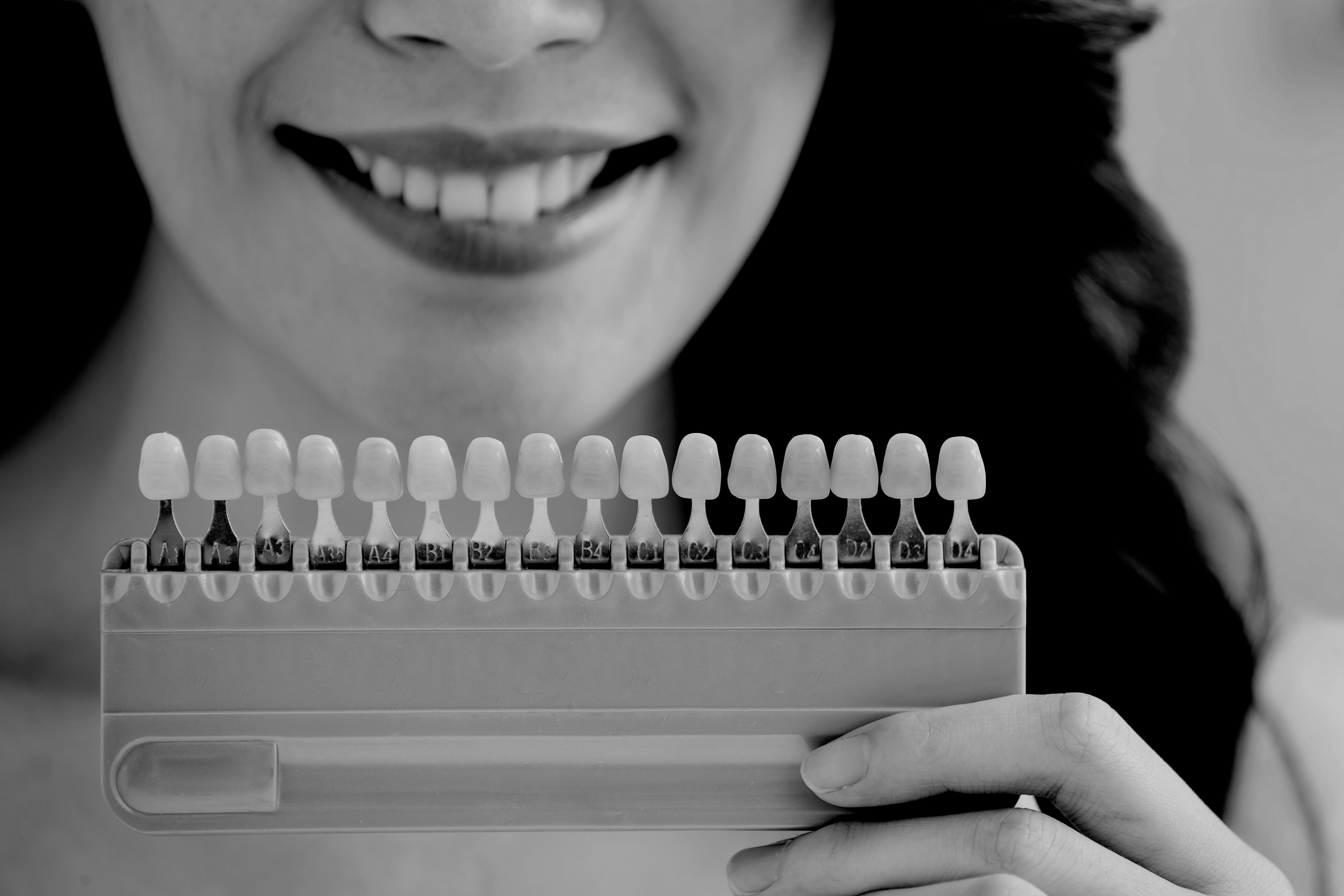
Research from a leading toothpaste manufacturer in 2012 has shown that:
– More than one in five people have been shown to be dissatisfied with the colour of their teeth
– Literature suggests that younger people are more concerned about teeth appearance than older people
As Anna Salat, Style Italiano, says, “Bleach – with or without composites – offers many advantages. I believe it to be the easiest and most affordable way to start the patient’s journey to the perfect smile.”
What makes people feel this way?
According to a survey carried out by a leading toothpaste manufacturer in 2013, many people believe that whiter teeth:
– Make you look more successful
– More employable
– More attractive
– Five years younger
In addition, most respondents want their teeth to be two shades whiter, with three out of four dentists saying that yellow teeth is still the biggest problem with the nation’s smiles.
Our full blog on tooth whitening in numbers dives deeper into the stats behind tooth whitening.
| Seapoint Clinic in Dublin, Ireland, saw a 25% jump in demand for professional tooth whitening in 2015-16, compared to a 15% year on year increase in previous years. |
The dental clinic’s 2015 survey of 159 people also found that:
– 9 out of 10 Irish women envy other people’s smiles and long for whiter teeth
– 52% of men admitted to smile envy
– 48% of men wished their teeth were straighter
What are people doing about their teeth?
Research from Mintel in June 2014 revealed that:
– 30% of British people use whitening toothpaste as part of their daily routine, with 55% having used it in the previous three months.
– 14% of people had used tooth whitening strips and kits in the previous month.
How the sector looks
Tooth Whitening Industry Statistics
Total annual tooth whitening industry revenue $11,000,000,000
Annual spending on tooth whitening products $1,400,000,000
Average price of in-office dental tooth whitening procedure $600
Average price of home tooth whitening kit $34.99
(source: American Academy of Cosmetic Dentistry)
Chemical Balance of Different Tooth Whitening Procedures

Tooth Whitening Surveys

(source: American Academy of Cosmetic Dentistry)
Professional tooth whitening treatments have grown in numbers as consumer demand has increased. Today there are numerous options on the market, from those carried out at home to those administered in dental surgeries.
Treatment options fall into four categories: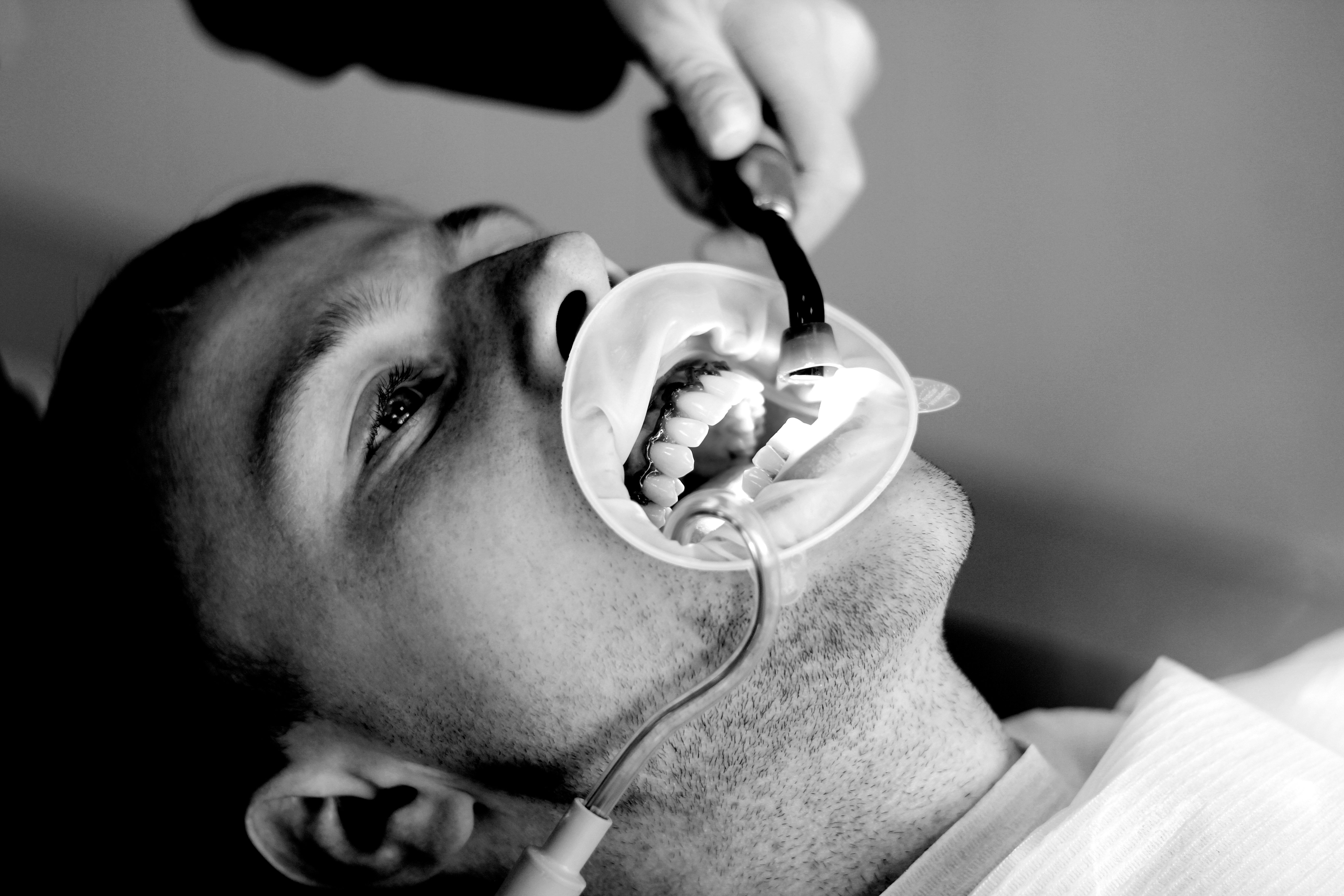
– Toothpaste
– Micro abrasion
– Air polishing
– Peroxides
Peroxide whitening
Peroxide whitening involves bleaching the teeth, and can be broken down into three distinct categories:
– Strips, pens, pre-made trays
– Professional home whitening
– Professional ‘power’ bleaching in-office: all soft tissues are isolated, and chemically activated gel is applied to the tooth’s surface. In some cases a light is then put into position and directed at the gel to ‘enhance’ whitening
Prospective patients need reassurance
While treatment options are more readily available, the dental industry still has to work hard to reassure people about going to the dentist.
Patients want to whiten their teeth and improve their smiles, but many are put off by the thought of visiting a dentist. They are concerned with comfort, cost and convenience.
It may be surprising just how little the public understand about the dental profession, and there is a big opportunity for dental professionals to inform, educate and reassure people.
|
FAST FACT
|
The numbers show that there is some hand holding to be done…
– Almost half of UK adults have a fear of the dentist.
– 12% of these suffer from extreme dental anxiety.
– Women are more likely to suffer from extreme dental anxiety than men.
– Visiting the dentist is ranked number one (22%) for making people nervous – even more popular than heights (19%).
(Source: National Smile Month)
| Nearly half the population are unhappy with their teeth (48%), With 64% citing discoloured teeth as the main reason for being unhappy. – National Smile Month |
The Options for Tooth Whitening
Advising your patients on tooth whitening treatment options
There are many techniques to enhance the appearance of teeth, simply by removing surface staining, lightening the internal pigments or by utilising more complex restorative materials. We have listed the treatment options below, starting with the least invasive and most cost effective solutions, through to more invasive procedures.
You can use this as a guide when helping your patients choose the right treatment for them.
Whitening toothpaste
Easily accessible over the counter, whitening toothpastes contain more abrasives or additives which work to break down and remove surface stains and revive the tooth’s natural colour.
Scale and polish
A regular scale and polish is often enough to keep a natural smile clean and bright, while maintaining the integrity of the tooth surface. Prophylaxis treatments such as AirFlow use a silicone coated powder which remove stains effectively and quickly without impacting on the surface of the tooth.
Smile strips and preloaded trays
This delivery of Hydrogen Peroxide is a professional alternative to less predictable over the counter products. They don’t require impressions and can be used immediately.
Custom tray whitening – the gold standard
Carbamide Peroxide or Hydrogen Peroxide gel in a custom fabricated tray is the traditional tried and tested way to lighten the internal pigments of teeth. This approach improves the appearance of teeth without altering any tooth structure.
“The custom tray ensures the gel is evenly applied, and it can produce some pretty impressive results” – Dr Matt Messina, American Dental Association spokesperson, time.com, 2014
Microabrasion
Using silicone carbide combined with hydrochloric acid, fluorosis staining can be gently removed using chemical abrasion in less than 0.2mm enamel depth.
In-surgery whitening
Hydrogen Peroxide formulations are generally used for this type of procedure. Due to their quick penetration, the results are more immediate, although this often requires an aftercare home treatment to ensure that the change in shade is stable.
RCT and walking bleach
This is a very effective way to lighten non-vital teeth that have been discoloured by trauma or over time. Using the ‘walking bleach’ technique, the remaining tooth structure can be lightened to the required shade in a very controlled way over several weeks.
Composite restorations
Composite is an effective restorative material for altering shade, shape and surface texture of teeth. It wears like natural tooth structure, and occasionally requires some maintenance to keep its appearance looking vital with high shine.
Veneers
Porcelain is renowned for its high quality aesthetics, function and extensive research. Lab communication, bonding and cementation are key elements in getting the best results. Full smile design cases can attract higher costs, but can have a significant impact on patients’ lives.
Crowns
Crowns require more severe removal of tooth structure, and this is often only recommended when there isn’t a suitable alternative treatment.
| “I prefer the option of whitening at home with a custom made tray because time in the dental chair is minimised – This is an important factor to take into account in any dental practice. It is convenient in many senses: the patient can regulate the degree of whitening and can whiten at any time of day or night, for short or extended periods.” – Anna Salat, Style Italiano |
Tooth Whitening – What, When and How
When it comes to whitening agents, the two key choices are Hydrogen Peroxide (HP) or Carbamide Peroxide (CP). These come in different strengths. Have a look at some of the facts based on products currently available in the market…
6% Hydrogen Peroxide (equivalent to approx. 18% Carbamide Peroxide) – the strongest EU accepted whitening gel can be used at home by the patient in a custom fabricated tray for 30-90 minutes at a time.
16% Carbamide Peroxide – this gives very similar results as the 6%HP. However, due to the make up of Carbamide Peroxide, it breaks down slower meaning the ideal time to wear this treatment is around 2-4 hours
10% Carbamide Peroxide – this is the original percentage of gel used in NGVB (Nightguard vital bleaching – also known as ‘tray bleaching’ or ‘at-home bleaching’) as advised by Dr Van Haywood, Professor in the Department of Oral Rehabilitation, School of Dentistry, Medical College of Georgia (MCG). This has been proven to be very effective when worn in a custom tray overnight, or for up to 8 hours at a time.
5% Carbamide Peroxide – this is ideal for patients who suffer from sensitive teeth, however only one company currently has a product this strength. It has a patented chemistry which makes it as effective as a 10%CP due to an active alkalinity boost.
(Source: NOVON)
| “10% Carbamide Peroxide in a custom-fitted tray is generally the safest, most cost-effective whitening treatment available” – Dr Van Haywood, Professor in the Dept. of Oral Rehabilitation, Medical College of Georgia (MCG). |
Most patients that have a shading of A&B (according to the VITA shade standard) will be very responsive to whitening and will often reach very light shades in one to two weeks.
Patients that have dark staining – a VITA shade of C&D – may require a longer treatment plan due to the nature of the pigments in the dentine.
|
TIP
|
 Gregory Camaleote – Tooth Whitening Case
Gregory Camaleote – Tooth Whitening Case
The patient visited the practice hoping to improve the colour of their teeth. Following Style Italiano’s tray protocol and using a 6% Hydrogen Peroxide whitening solution, the teeth were bleached for enhanced results. This started with treating the upper arch, followed by the lower arch.
Download the full version of this tooth whitening case.

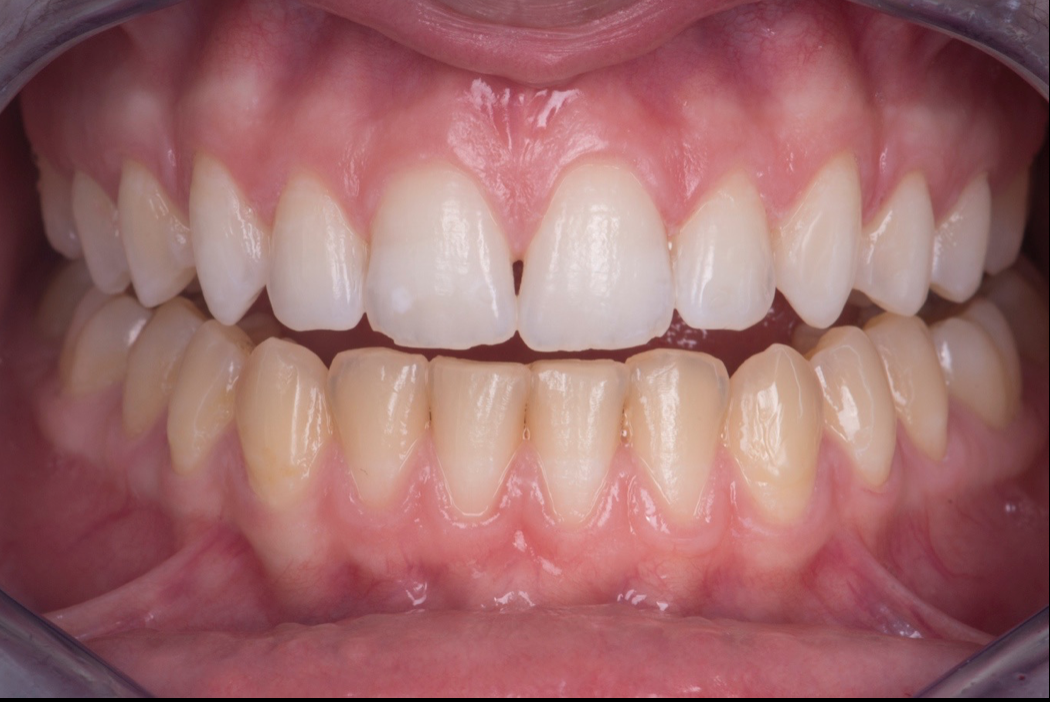
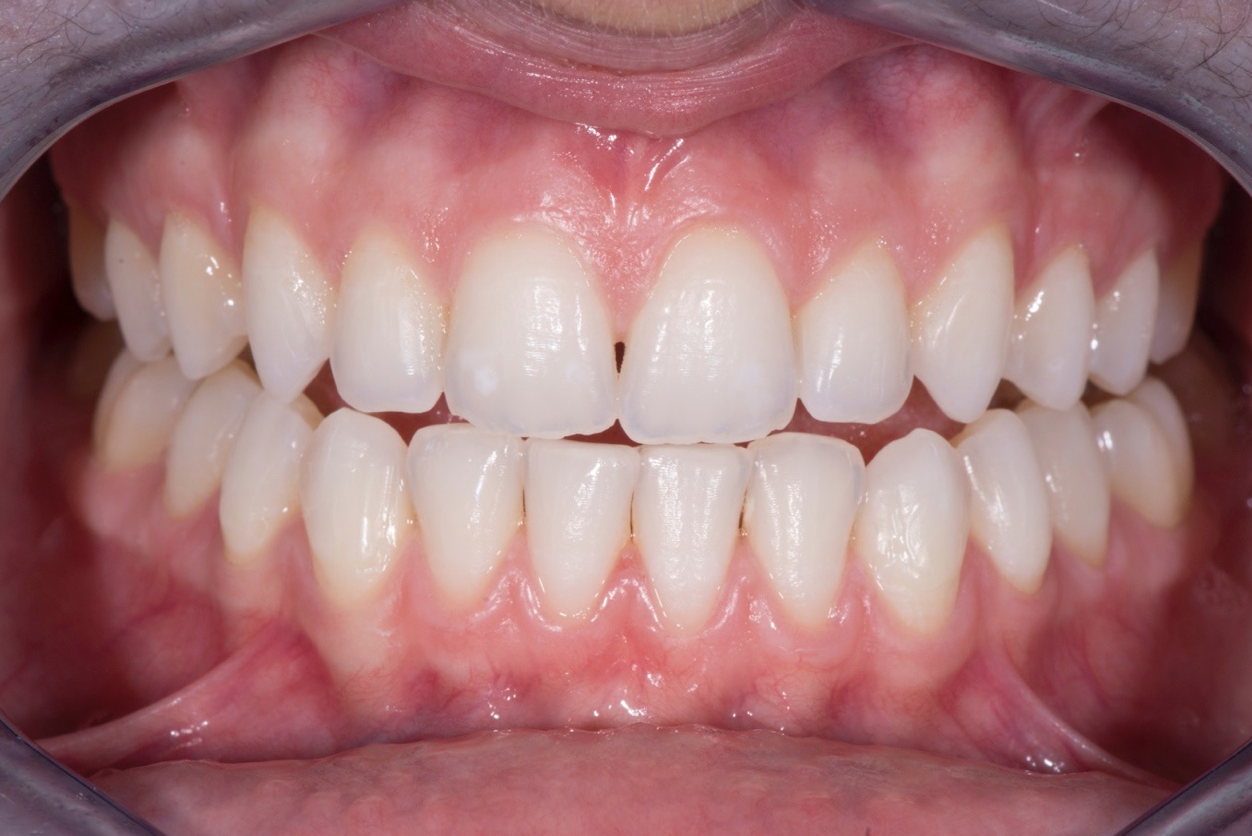
|
FAST FACT
|
The design of the tray is just as important as the gel itself. The tray needs to fit snugly around the patient’s teeth. If it doesn’t, the gel can escape or become diluted. If the tray is not finished correctly, it can also irritate the gums and be very uncomfortable.
It is generally recognised that the most efficient and effective methods of applying whitening products to natural teeth is via a custom made whitening tray. To be as effective as possible, this tray must be professionally made.
Customised trays can accommodate virtually all patients’ requirements. This can include a ‘full mouth’ tray or a modified tray, which can be designed to whiten selected teeth only.
Making an impression
An accurate impression is important. A whitening tray can only be effective when certain criteria are met. Ideally, impressions should only be taken in a rigid impression tray. This prevents any risk of distortion, which can lead to a poor fit. When the laboratory receives an impression, it can accurately cast models in a highly permeable model stone.
The dentist chooses to go with or without reservoirs, and the tray must be scalloped correctly followed by flaming and smoothing of the trimmed margins. This will help to ensure that an accurate sealing at the gingival margins is achieved.
The laboratory recommends a finished tray thickness of 1mm. This allows sufficient flexibility of the tray when the patient is inserting and removing it from their mouth. A correctly made tray will help the patient to achieve optimum results from the whitening gel, without any of the problems that can be experienced with ‘one size fits all’ home whitening products.
3D Imaging
Digital Impressions through 3D imaging are becoming more widely used, and this is particularly effective in ensuring accurate tray design. Most good laboratories will have this service available.
As with the advent of any new technology, it’s important for dental professionals to consider new alternatives. In the case of 3D dental imaging, the advantages are clear, offering practitioners and patients alike a better clinical experience.
A 3D dental image can also be used multiple times, offering a fast, accurate approach that is consistent and reliable.
What Causes Discolouration – And How Whitening Works
There are numerous causes of teeth discolouration. Key factors include:
– Drinks (cola, coffee, tea, wine)
– Tobacco (cigarettes, chewing)
– Ageing (due to enamel thinning)
– Medicines (tetracycline, fluoride)
– Trauma
The extent of the patient’s discolouration will determine how long the whitening treatment will take to work. The following times are a guideline:
– Normal discolouration: one to two weeks
– Tetracycline: two to six months
– No stains or pigments: no whitening
The mathematics of professional tooth whitening and peroxide
In accordance with the British Dental Association (BDA), the maximum concentration of Hydrogen Peroxide that may be used in the EU is 6% present or released. 10% Carbamide Peroxide content produces a maximum of 3.6% Hydrogen Peroxide. Commonly used products containing 16% Carbamide Peroxide are therefore permitted because they would normally be releasing less than 6% Hydrogen Peroxide.
The following figures detail the amount of Hydrogen Peroxide released by a set amount of Carbamide Peroxide:
– 10% Carbamide Peroxide = approx. 3.3% Hydrogen Peroxide
– 16% Carbamide Peroxide = approx. 5.3% Hydrogen Peroxide
– 6% Hydrogen Peroxide = approx. 18% Carbamide Peroxide
Four steps to whiter teeth…
Tooth whitening works because Hydrogen Peroxide breaks down into water and an oxygen free radical. There are four key steps in the process:
- H202 breaks down into HOO- (perhydroxyl ion) and H+ (hydrogen)
- The perhydroxyl ion passes through enamel into the dentine
- The perhydroxyl ion breaks down the large organic molecules that cause staining of the teeth
- The chroma and value of the tooth is changed.

Ensuring the correct PH
For good stability and shelf-life, the product must be manufactured at pH <7.0. Yet for Hydrogen Peroxide to bleach effectively, it needs: pH > 7.0. In other words, the bleaching action of Hydrogen Peroxide is influenced by its surrounding conditions.
The pH scale is a measure of acidity or alkalinity:
– neutral pH = 7.0
– acidic pH < 7.0
– alkaline pH > 7.0
In acidic conditions Hydrogen Peroxide is stable, therefore ineffective as a bleaching agent. But it is unstable in alkaline conditions, prompting the release of Perhydroxyl ion. Perhydroxyl ion is responsible for bleaching by breaking down large staining molecules into smaller colourless molecules.
Choosing the Right Gels And Safety
In the growing field of dental aesthetics, there are numerous companies marketing and advertising products to the industry. But as with any other dental product, seeing evidence of efficacy is a leading requirement. Dental professionals will rightly expect a high standard from all their materials, including their whitening gels.
There are a number of key considerations to bear in mind when choosing the right gel…
pH level – Peroxide is most efficient and active at a neutral pH of 7.0 or above. Some companies struggle to stabilise the product and, therefore, reduce the pH level to compensate this. This makes it more acidic and increases the chance of sensitivity and possible damage to the enamel. Make sure you choose a gel with a near neutral pH that has as an increased alkalinity once applied.
Tray design – Tray design is important in any bleaching procedure. There must be a good seal around the gingival margin, regardless of reservoirs on the labial surface. The gel will not run out of the trays if it is the right viscosity.
Water content – It is important for gels to be water based, as peroxide dehydrates the teeth. Look for a gel with a high water content of approximately 20% that still retains optimum viscosity.
Desensitiser – Some gels contain desensitisers such as Potassium Nitrate and Fluoride, which are very effective at reducing sensitivity during the treatment. It is advisable to bear this in mind when making a decision.
Flavour – Many products contain glycerine to prolong the shelf life of their products. This can negatively impact the taste of the gel and can be hard to mask. Choose something that has a fresh flavour and will make the treatment more pleasant for your patients.
Choosing your preferred percentage
10% Carbamide Peroxide is the original formula used in many studies with proven results. This can be worn overnight. The NGVB gel gives predictable and long lasting results.
Hydrogen Peroxide or higher concentrations of Carbamide Peroxide usually have less wear time which can be convenient for those who don’t like to wear the tray while sleeping.
Choosing a brand that has flexibility ensures greater patient choice.
Learn more about the science of tooth whitening with our blog.
|
SAFE WHITENING
|
The British Dental Association (BDA) says whitening is perfectly safe if carried out by a registered dental professional. But the BDA also warns that those who are not registered dental professionals will lack the right training or knowledge and could cause permanent damage to a patient’s teeth and gums.
The dental industry is continually working to develop new techniques in aesthetics and restorative dentistry, and help dentists offer an unbeatable patient experience.
To demonstrate some of the latest techniques in professional tooth whitening – and how you can achieve excellent clinical results – here are two cases from Style Italiano’s Anna Salat and Stefan Koubi.
 Anna Salat – Tooth Whitening Case
Anna Salat – Tooth Whitening Case
The patient wanted to improve the appearance of their smile, particularly the shape of their teeth. Ahead of the restorative treatment, Dr Anna Salat recommended bleaching the teeth to achieve the best aesthetic results.
To provide the fast acting and stable results the patient required, Dr Salat used a whitening gel with Hydrogen Peroxide as this breaks down quicker than Carbamide Peroxide.
Using 6% Hydrogen Peroxide which was applied for 30 minutes a day using a tray, the patient’s teeth improved from A35 to 0M1 in just two weeks. The teeth were now successfully prepared for the next step of the treatment – direct composites.
Watch Anna Salat talk more about White Dental Beauty.

 Stefan Koubi – Tooth Whitening Case
Stefan Koubi – Tooth Whitening Case
Before receiving restorative treatment for diastema and microdontia, Dr Stefan Koubi improved the colour of the patient’s teeth improve the aesthetic integration.
Using a unique 5% Carbamide Peroxide whitening solution, the patient’s smile was enhanced over two weeks. Due to the patented chemistry in the bleaching system (NOVON), the results were just as effective as alternative solutions with higher percentages of CP – and with less sensitivity.
Following the whitening treatment, a combination of composite bonding and porcelain cementation facilitated the end result.
Download the full version of this tooth whitening case.

Patient Communication and Marketing
Asking the right questions allows you to better understand your patients’ needs and 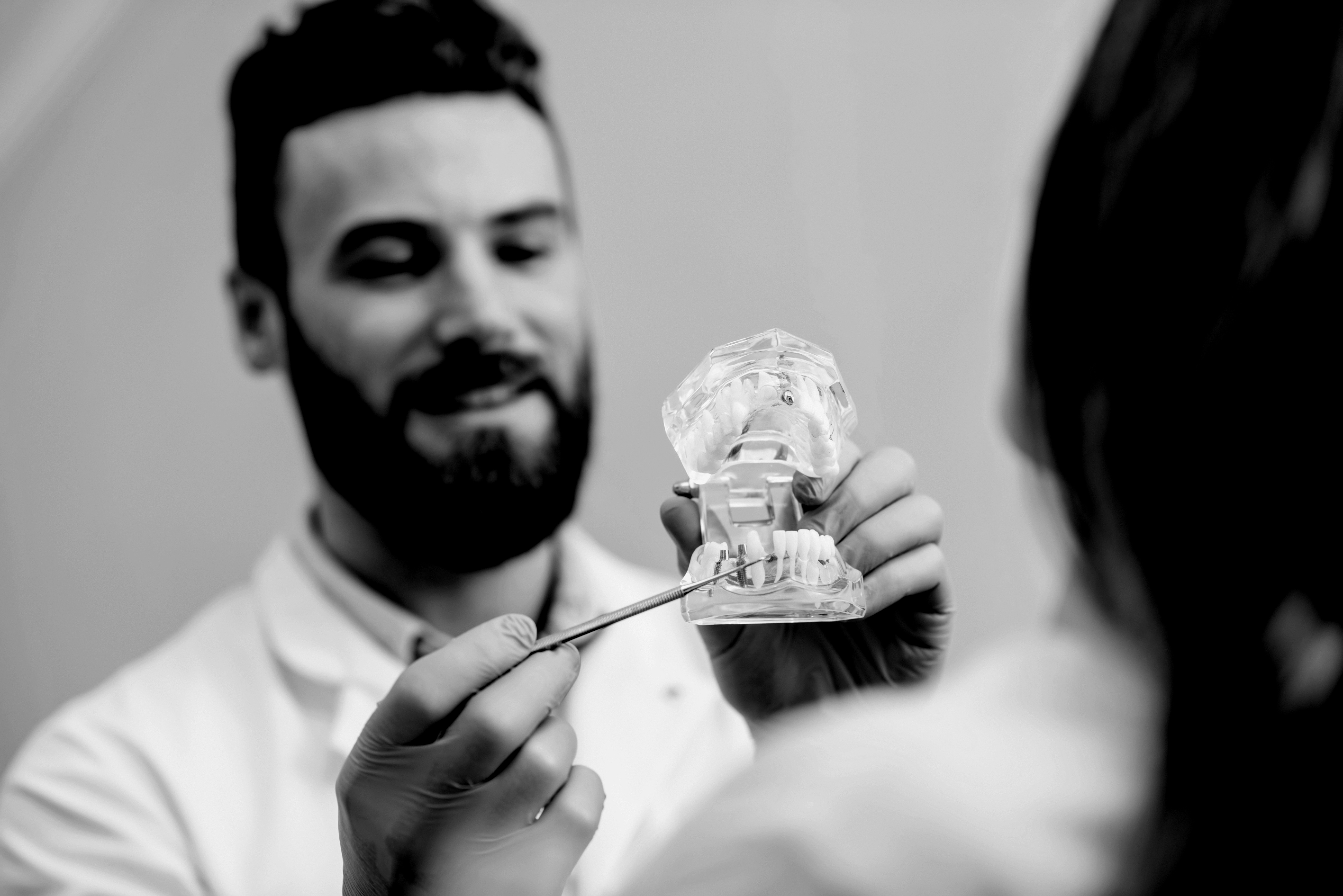 give them what they want. Without knowing the range of aesthetic options on offer, patients will be unable to consider how their teeth – and their smile – could be enhanced.
give them what they want. Without knowing the range of aesthetic options on offer, patients will be unable to consider how their teeth – and their smile – could be enhanced.
There are eight steps to effective communication and marketing of professional tooth whitening:
1. Work as a team
Because of the enormous appeal of professional tooth whitening, the treatment can be used to attract new patients as well as retaining existing ones. It can be used to reward patients for completed treatments, motivating them and enhancing their natural teeth shades alongside or prior to restorative work.
As a team driven strategy, this requires very little of a dentist’s time because all members of staff can educate and prepare the patients, arrange procedures, deliver instructions and follow up to ensure everything has run smoothly.
Now that hygienists are able to deliver different whitening treatments following a dentist’s prescription, there are huge opportunities to better utilise team members. This frees up dentists’ time to concentrate on administering additional and perhaps more demanding procedures.
The hygienist appointment presents the perfect environment to discuss and perform such aesthetic treatments.
|
FAST FACT
|
2. Stimulate – and answer – questions
Brochures and marketing materials are designed to stimulate questions. Ensuring that the practice team is well prepared to answer these questions thoroughly is key to offering exceptional customer service, and will enable patients to properly consider the treatment options. Make sure your team understands the brochure content, your practice’s commitment to the treatments on offer, and the importance of patient satisfaction.
3. Appoint a champion
Identify one person in the practice to be the whitening / cosmetic treatment consultant – or champion. They can answer all patient concerns, start discussions and help to generate interest.
It is also a good idea to give your practice team the opportunity to whiten their teeth. They are a powerful walking advert for the treatment and can speak from experience.
4. Get Educated
Practices who have engaged in learning about tooth whitening in depth have more successful treatment conversions. There are many ways of gathering and sharing best practice within the dental community, both online and in person.
As Anna Salat, Style Italiano says, “Going to courses and sharing cases with colleagues is a valuable way to learn more about tooth whitening techniques, and Facebook is my new university.”
Once dental practices consider themselves to be experts in tooth whitening, confidence in the practice grows.
Figures from Optident in 2017 show that 40% of those who consider themselves to be ‘experts’ offer professional tooth whitening every day, compared to only 7% of those who consider themselves ‘less knowledgeable’.
In addition, once people have successfully engaged in tooth whitening treatments they are much more likely to consider other cosmetic dental work, and are often more engaged in maintaining their oral health.
5. Use real people with real stories
Make a gallery of your cases: before and after pictures are a great selling tool. Illustrating real cases helps to manage patients’ expectations, and most people would rather see other patient’s results than unrealistic magazine images that have been airbrushed.
|
TOP TIP
|
6. Tap into digital marketing
Engaging your patients while they are visiting your practice is a great way to interest them in professional tooth whitening, but there are numerous other marketing opportunities outside the practice.
Use your website and social media to let patients know about your whitening services. Ask whitening patients if you can take ‘before’ and ‘after’ photos for your website and Facebook page, and ask if you can tag them in any social media posts. This will not only show off what you can do to current patients, it will connect you to plenty of potential new patients who may be interested in what whitening can do for their smile.
7. Display the product
Use point of sale material and display the products and packaging. People like to see what they are buying. If the packaging denotes a luxury or high quality item, people will feel good about their purchase. Giving them something tactile when they leave the practice – as well as whiter teeth – is going to give them a greater sense of value.
8. Make whitening an integral part of your offering
Whitening is a great tool for growing your practice and making it stand out from competitors, but only if you take the time to make the treatment an important part of your everyday routine.
Tooth whitening creates patients who are more invested in their smile and who are more likely to keep that smile healthy. It may also encourage patients to opt for elective cosmetic services at a later date.
By making a few small changes and committing to promoting professional tooth whitening, your practice can reap the benefits of a successful whitening programme. And your patients can enjoy their whiter, brighter smiles.
The Bottom Line in Tooth Whitening
In order to continue to offer an exceptional service to your patients, and keep up with the costs of running a busy practice, you must consider your ROI and profit margins.
Here we have outlined some examples of how a moderate increase in your tooth whitening business could have a significant effect on your practice turnover.
|
FAST FACT
|
How tooth whitening can impact on the bottom line
As an example of how to calculate your ROI you can consider the following calculations based on your own costs.
For Example:
| Item | Cost | |
| Tooth Whitening Kit | £50 | |
| Tray Costs = £25 each arch | £50 | |
| Impression cost | £30 | |
| Total | £130 | |
Selling treatment at £275
| Profit | ||
| Profit per treatment sold | £145 | |
| Profit Margin | 53% | |
| After selling 5 per month | £725 | |
| Over year | £8,700 | |
… Just selling two or more treatments per week at these costings could increase profits by over £15,000.
This is just an example and overall results will vary depending on your own costs.
Understanding the Legalities of Whitening Products
The EU law relating to tooth whitening changed on 31 October 2012, effectively  increasing the percentage of Hydrogen Peroxide contained or released in tooth whitening or bleaching products to 6%.
increasing the percentage of Hydrogen Peroxide contained or released in tooth whitening or bleaching products to 6%.
(This subject to conditions which include first use by a dental practitioner or under their direct supervision and that the patient is 18 years of age or over.)
The change follows as an amendment to the EU Directive 76/768/EEC concerning cosmetic products. The amending Council Directive 2011/84/ EU was published in September 2011 requiring the UK Government to amend the law. The Cosmetic Products (Safety) (Amendment) Regulations 2012 (The ‘Regulations’) amend the previous regulations relating to professional tooth whitening.
The Regulations allow the use of Hydrogen Peroxide and other compounds or mixtures that release Hydrogen Peroxide, including Carbamide Peroxide and Zinc Peroxide, to be used for professional tooth whitening. The maximum concentration that may be used is 6% present or released.
Make sure you know how to whiten with our tooth whitening protocol.
In broad terms, 10% Carbamide Peroxide content would yield a maximum of 3.6% Hydrogen Peroxide. Thus, the commonly used products containing 16% Carbamide Peroxide are permitted because they would normally be releasing less than 6% Hydrogen Peroxide.
Conditions
The Regulations set out that products containing or releasing up to 6% Hydrogen Peroxide can be used, subject to the following conditions:
An examination is required first
The dentist should carry out an examination before embarking on a course of professional tooth whitening to determine whether it is a suitable treatment option.
To only be sold to dental practitioners
Only dental practitioners can purchase tooth whitening products containing or releasing more than 0.1% Hydrogen Peroxide up to 6% Hydrogen Peroxide.
For each cycle of use, first use by a dental practitioner
Dental Protection advises members to make a detailed contemporaneous record of the examination and the instructions given to the patient at the first appointment.
Under direct supervision
The General Dental Council’s Scope of Practice sets out that hygienists and therapists can provide tooth whitening under the prescription of a dentist, if they are trained and competent. Thus hygienists and therapists can administer the first use of professional tooth whitening, if an appropriate level of safety is ensured.
Trained and competent
Dental Protection advises members that it is appropriate that the dentist is on the premises when the first use of the tooth whitening product is provided to the patient by a therapist or hygienist.
Completing the cycle
The dentist’s duty extends to continuing to monitor the provision of top-up gels and ensuring this is in accordance with the patient’s treatment plan.
Advertising
Dental practices can advertise professional tooth whitening procedures using products containing or releasing up to 6% Hydrogen Peroxide.
Medical Devices Directive
We are aware that some manufacturers in Europe are marketing tooth whitening products containing or releasing more than 6% Hydrogen Peroxide as medical devices. Even if a tooth whitening product is marketed as a medical device, it falls within the Cosmetic Products (Safety) Regulations 2008, the 2012 Regulations. This means it is not possible to circumvent the Regulations by using a product that has a CE mark.
Under-18s
The Regulations and EU Directive specifically state the product must not be used on patients aged under 18. If a member wishes to provide treatment to a child in breach of the Regulations, they are advised to contact Dental Protection for advice.
Breach of the Regulations
The maximum penalty for breaching the Regulations is a sentence of imprisonment not exceeding six months.
Above 6%
If a member is considering using products that release or contain more than 6% Hydrogen Peroxide and thus breaching the Regulations, Dental Protection advises members to contact Dental Protection for advice.
Reporting of adverse effects
If members are treating a patient who experiences an adverse effect they are advised to keep a record of this.
Tooth whitening is a key driver behind the predicted growth of the wider cosmetic dentistry sector. Public awareness of how teeth look is much more acute in today’s media-centric world, an awareness which is fuelled by high profile people sharing images of their beautiful smiles online. It is an appetite that is only likely to increase.
As consumers become more educated about the professional tooth whitening options available – and, critically, learn which of these treatments are both safe and effective – the dental industry should be prepared to meet increased demand.
There is a need to inform and educate consumers, as well as an opportunity to offer a range of professional treatments, affording dental practices the chance to really stand out from competitors.
The potential audience is diverse – from those who want an affordable option or a quick fix, to those who are willing to invest a greater amount of money for exceptional results.
Among the various tooth whitening treatments available, custom tray whitening using Carbamide Peroxide or Hydrogen Peroxide has emerged as one of the most popular and effective treatments on the market. Aside from the customer convenience this approach offers – not to mention minimising the all-important demand on a dental professional’s time – this has also been endorsed by a number of pre-eminent dental specialists.
Not least Dr Van Haywood, Professor in the Department of Oral Rehabilitation, School of Dentistry, Medical College of Georgia (MCG), who cites 10% Carbamide Peroxide in a custom-fitted tray as “generally the safest, most cost-effective whitening treatment available.”
As in any burgeoning industry, there are numerous companies marketing and advertising professional tooth whitening products, and it is key that dental professionals see for themselves the safety and efficacy of any product before making a choice. Having a good understanding of how whitening works and the various options available is therefore essential if the right choices are to be made.
A good level of knowledge is also critical if dental professionals are to pre-empt common patient questions and concerns, informing and reassuring consumers about the right treatment for them. Such knowledge is also pivotal in effectively marketing professional tooth whitening inside and outside the practice.
Tooth whitening is a swiftly maturing market in which profit margins are healthy for any well-run dental practice. As the audience grows, so will profits, particularly as economies of scale take effect.
But, as with any emerging field, success will hinge on working with trusted partners who can demonstrate expertise, credibility and reliability in this fast moving space.
Learn more about White Dental Beauty and start your journey with professional tooth whitening.

.jpg)
.png)